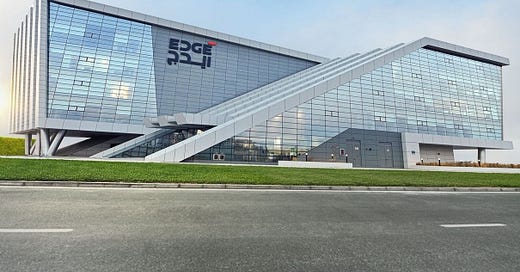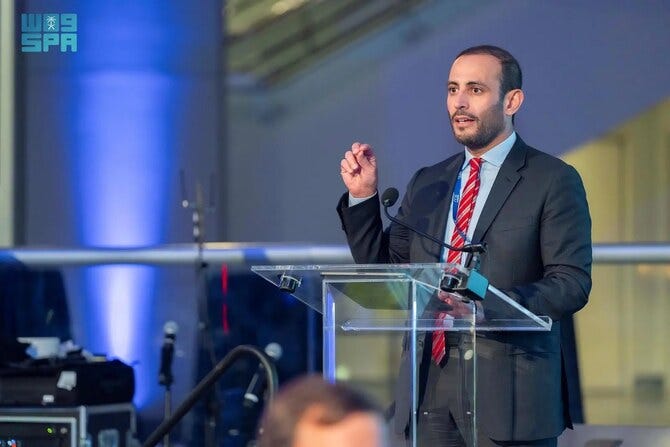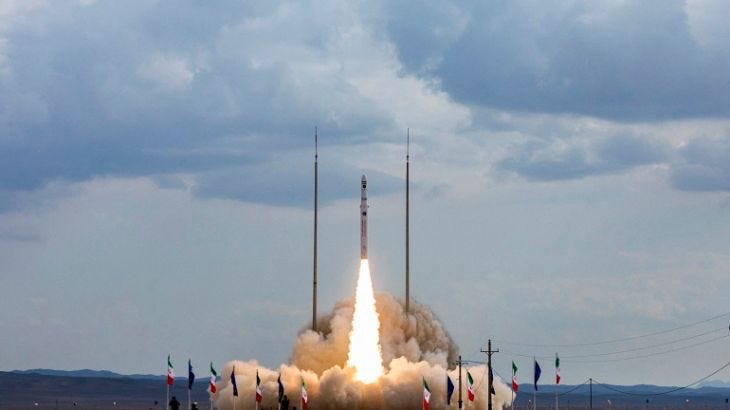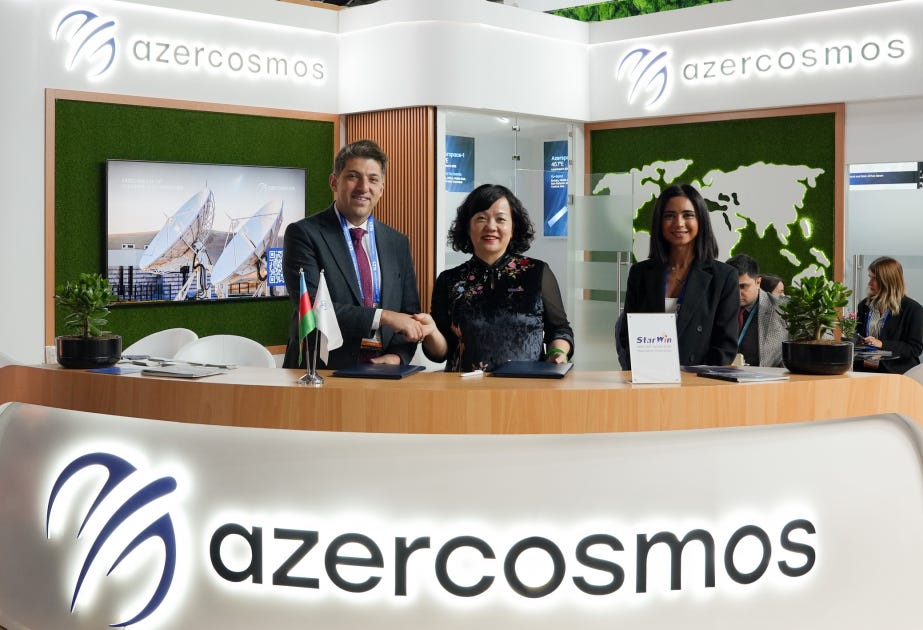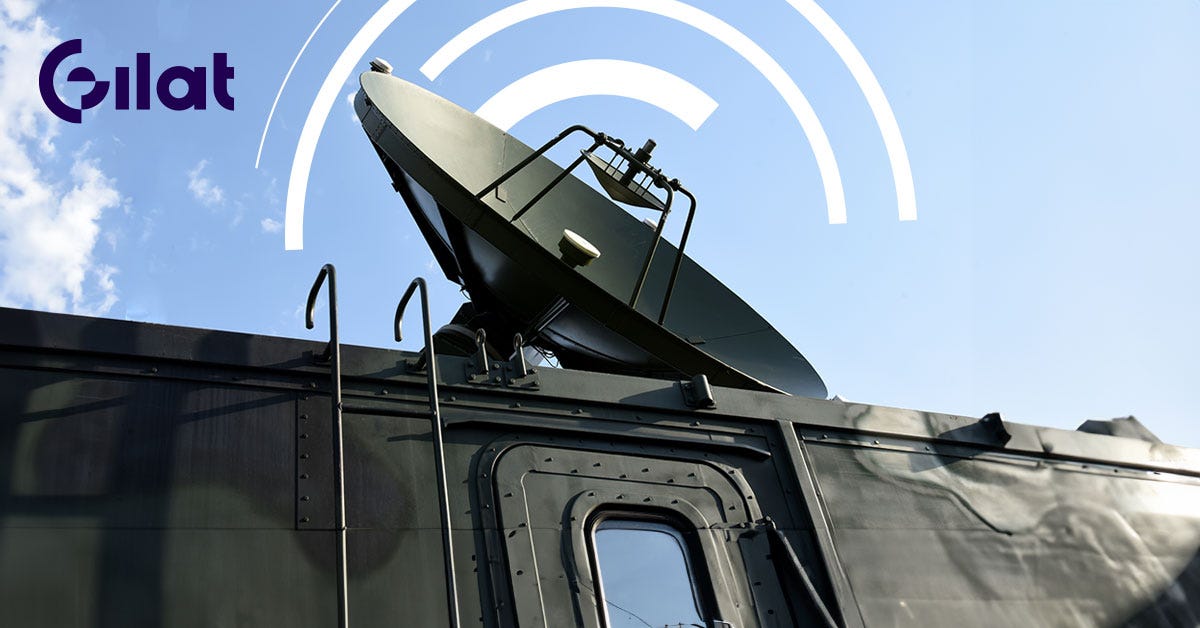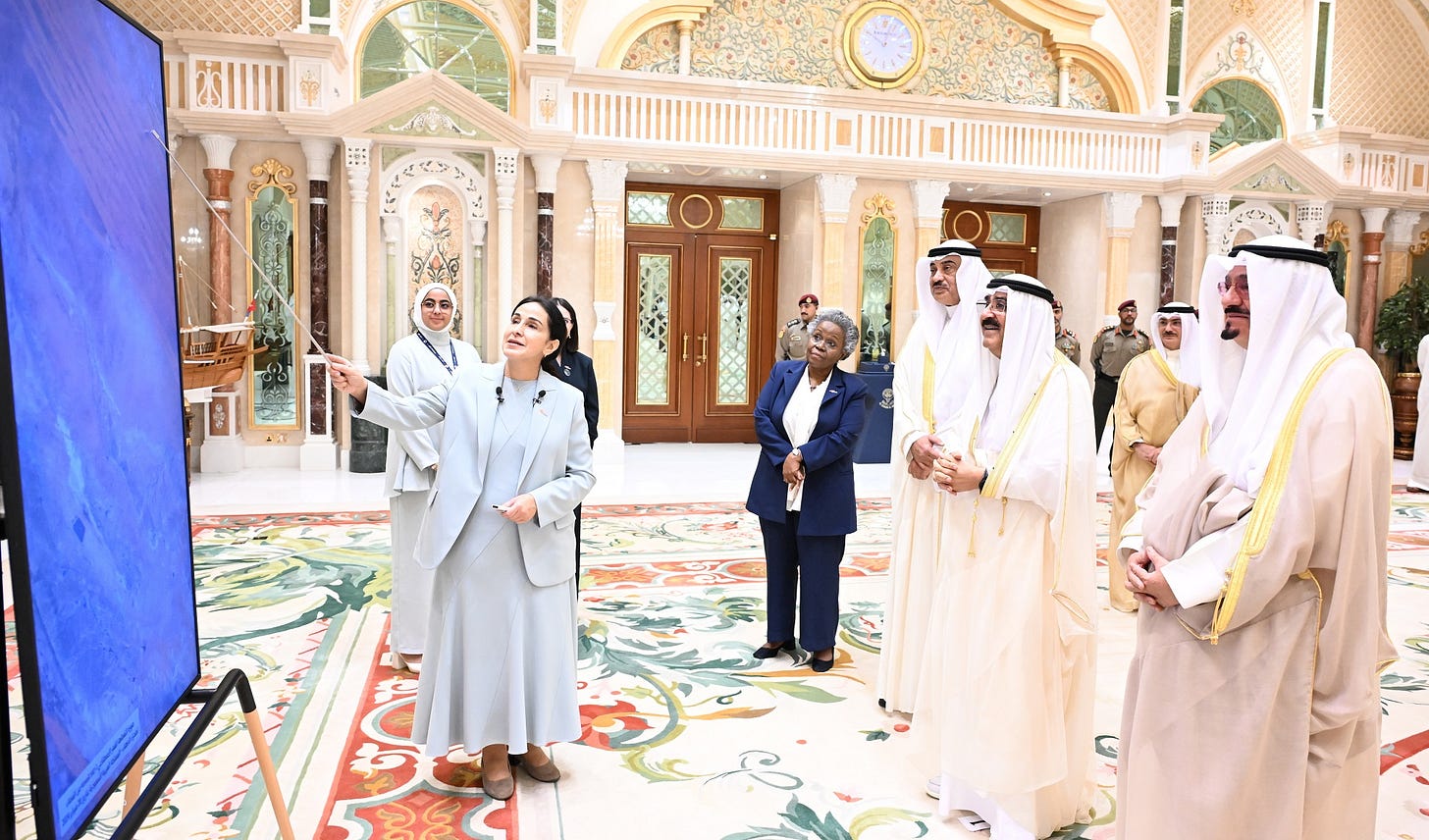Middle East Space Roundup: 16 to 22 September 2024
A summary of all the space news in the Greater Middle East over the past week, brought to you by AzurX
The following are the major space developments in the Greater Middle East region tracked by Middle East Space Monitor over the past week:
UAE Space Developments
UAE’s EDGE Group Announces Launch of its Fada Space Company
UAE defence conglomerate EDGE Group has announced the launch of a new space company, Fada, focused on manufacturing and assembling Earth observation satellites while also providing cybersecurity solutions. Fada will develop the UAE Space Agency’s Sirb constellation, a series of synthetic aperture radar (SAR) imaging satellites, under a contract awarded last year. Waleid Al Mesmari, president of space and cyber technologies at EDGE, indicated that Fada aims to establish a comprehensive service platform for Earth observation applications, enhancing capabilities in areas such as urban planning and emergency response. This move marks a significant expansion for EDGE into the growing global space industry. Fada plans to integrate cybersecurity technologies into its satellite systems, addressing increasing geopolitical tensions and cyber threats. Operations will be based in a new manufacturing facility in Abu Dhabi dedicated to satellite development, which is expected to create jobs and foster technological advancement within the UAE. The facility, currently in the design phase, will support various satellite subsystems, contributing to the UAE's goal of establishing a robust private space sector.
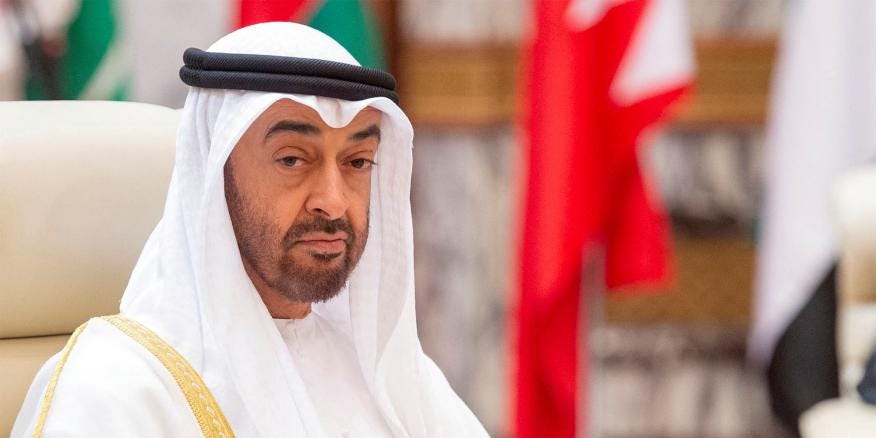
UAE’s MBZ State Visit to the United States will include Space Cooperation Talks
UAE President Sheikh Mohamed bin Zayed Al Nahyan is set to undertake his inaugural official visit to the United States on 23 September 2024, with the objective of strengthening bilateral ties between the UAE and the U.S. In discussions with President Joe Biden, the leaders will focus on enhancing collaboration in vital areas such as economy, investment, technology, renewable energy, and climate action. The UAE-U.S. relationship, which has flourished over more than five decades, saw bilateral trade reach $31.4 billion in 2023, with US exports to the UAE increasing by 19% to $24.8 billion, resulting in a significant trade surplus for the U.S. This economic partnership supports approximately 166,000 American jobs across all 50 states. Key initiatives highlighted during the visit will include investments in renewable energy led by the UAE’s Masdar company in states like Texas and California, technological partnerships between G42 and Microsoft Azure in AI and cloud computing, and ongoing collaborations in space exploration with NASA and U.S. space firms. With over $1 trillion in UAE investments across various sectors in the U.S., the visit aims to deepen ties and align visions for a sustainable and prosperous future.
Official: UAE at Intersection of Technology and Geopolitics
The inaugural Hili Forum in Abu Dhabi highlighted the UAE's strategic position at the intersection of innovation and geopolitics, with significant advancements in artificial intelligence and space exploration. Omran Sharaf, UAE Assistant Minister of Foreign Affairs for Advanced Science and Technology, and Nicholas Butts from Microsoft discussed the growing intersection of technology and geopolitics, emphasising the emergence of a "tech cold war" characterised by global competition over emerging technologies. The UAE was praised for its balanced approach to technological advancement and national security, with notable achievements from the Technology Innovation Institute (TII) and Core 42. The country's public-private partnerships were cited as a key factor in its technological progress, positioning the UAE just behind the U.S. and China in this arena. The forum also underscored the UAE's collaborative approach in space and nuclear programmes as a model for international cooperation in addressing global technological challenges, highlighting the need for nations to navigate the complex landscape of innovation while addressing their own national interests.
Saudi Arabia Space News
Report: Saudi Arabia’s New Space Group May Build its Own Satellite Constellation
Saudi Arabia's Neo Space Group (NSG), backed by the Public Investment Fund (PIF), is strategically positioning itself in the satellite market by exploring options to lease multi-orbit capacity and potentially acquire or build its own satellite constellation. Speaking at the World Space Business Week 2024 in Paris, France, newly appointed CEO Martijn Blanken highlighted the company's focus on communications, geospatial services, navigation, and Internet of Things (IoT) monitoring networks, while also taking over commercial operations related to the Saudi GeoSatellite-1. NSG aims to leverage this satellite alongside leased capacities from other providers to enhance its service offerings. Additionally, the company is setting up a venture capital fund to invest in domestic and international businesses, emphasising in-flight connectivity (IFC) as a key priority. Blanken underscored NSG's fresh perspective in the space sector, unencumbered by legacy challenges, and expressed confidence in disrupting the market through innovative satellite technologies. The broader Saudi space industry is projected to grow significantly, from $400 million in 2022 to $2.2 billion by 2030, reflecting the country's ambitions to diversify its economy and establish a robust presence in the global space economy.
Saudi Arabia’s UN Ambassador Declares Space Debris a Threat to Human Rights
At the 57th session of the UN Human Rights Council, Saudi Arabia's permanent representative, Abdulmohsen bin Khothaila, raised critical concerns regarding the increasing threat of space debris to human rights and sustainable development. Speaking on behalf of 123 countries, he emphasised the necessity of outer space sustainability to preserve the benefits of space technology, which have transformed global communications, weather forecasting, and disaster management—essential elements in safeguarding fundamental human rights. Bin Khothaila warned that the rising issue of space debris jeopardises the infrastructure required for these operations, potentially hindering the global community's ability to uphold and promote vital human rights. He highlighted the connection between space debris management and the UN's Sustainable Development Goals, particularly Goal 9 (Industry, Innovation, and Infrastructure) and Goal 11 (Sustainable Cities and Communities). The ambassador's statements align with the views of key UN bodies, which have reiterated the importance of managing space debris for the safety of space operations, international security, and the environmental protection necessary for satellite services that support human rights and development.
Saudi Space Agency CEO Addresses Space Sustainability Issues in New York
Dr. Mohammed Al Tamimi, CEO of the Saudi Space Agency, recently participated in a high-level event in New York City focused on sustainable space exploration, organized by the UN Office for Outer Space Affairs (UNOOSA) at the American Museum of Natural History. The event aimed to strengthen international collaboration in space exploration to advance Sustainable Development Goals (SDGs), emphasising the use of satellite data for climate action and disaster risk reduction. Dr. Al Tamimi underscored Saudi Arabia's growing role in the global space sector and the importance of leveraging space technologies to address critical challenges such as climate change and natural disaster mitigation. He highlighted ongoing initiatives by the Saudi Space Agency to promote innovation and support global climate efforts, noting the agency's commitment to enhancing collaborative efforts with international partners to drive technological advancements in space.
Saudi Arabia to Host Halo Space Near Space Test Flight by the End of September
Saudi Arabia is preparing to host the next test flight of Halo Space, a leading player in near-space tourism, later this month. The announcement was made during a media event in Riyadh, where Halo Space revealed the establishment of final assembly and testing facilities in the Kingdom. This development is a significant step in Halo Space's strategic partnership with Saudi Arabia, aimed at positioning the country as a global hub for near-space activities. The upcoming test flight, scheduled for 27 September 2024 near Layla, will involve the unmanned Aurora capsule, which will be tested at an altitude of 30 kilometers to validate critical systems. Halo Space, which has successfully conducted five prior test flights, plans to begin commercial operations in 2026, with the first crewed test flight anticipated in 2025. The initiative aligns with Saudi Arabia’s Vision 2030, which seeks to diversify the economy and enhance the Kingdom's role in the burgeoning space tourism sector. Experts believe that Halo Space’s presence will create significant opportunities for the local economy, generating high-value jobs and new business prospects in both tourism and the space industry.
Saudi Arabia’s Marawid Invests in Sceye’s Near-Space HAPS Technologies
At the World Space Business Week (WSBW), Sceye, a leading U.S. aerospace company specialising in High-Altitude Platform Systems (HAPS), announced the successful closing of its Series C funding round, led by Saudi Arabia corporation Mawarid Holding Company. This funding round, which values Sceye at a pre-money valuation of $525 million, will provide the liquidity necessary for research and development, flight programmes, and the launch of initial commercial operations in 2025. CEO Mikkel Vestergaard Frandsen highlighted that this partnership with Mawarid will open new markets and enhance Sceye’s commercialisation strategy for its innovative HAPS technology. Following a successful 2024 flight programme demonstrating perpetual flight capabilities powered by solar energy and battery storage, Sceye aims to leverage HAPS technology to improve connectivity, manage disaster response, and monitor environmental changes. Mawarid's investment underscores its commitment to advancing technology and delivering strategic solutions across critical industry sectors.
Saudi Arabia’s CST Successfully Completes Madarik Space Training Programme
The Communications, Space and Technology Commission of Saudi Arabia has successfully concluded the Madarik programme, aimed at advancing the country's space sector by training 1,000 participants. Over three months, attendees received intensive instruction in three key areas: space business, space software and data, and space engineering. Conducted in collaboration with prominent institutions such as the International Space University, Georgia Institute of Technology, Thunderbird School of Global Management, and BAE Systems, the programme was hosted in Riyadh and Jeddah. By focusing on space economics, satellite application software, and spacecraft design, Madarik equipped participants with the skills necessary to contribute to Saudi Arabia's evolving space landscape and foster a sustainable future. This initiative reflects the commission's commitment to empowering national talent and promoting future careers in the space industry, targeting recent graduates and professionals to enhance the sector's regulatory framework and operational capabilities.
Saudi Arabia-Based Arabsat Announces Three Agreements at IBC 2024
At the International Broadcasting Convention (IBC) 2024, Saudi Arabia- headquartered Arabsat announced three significant partnerships aimed at enhancing communication and broadcasting solutions across various sectors. One notable collaboration with Saudi Netlink focuses on improving communication infrastructure for the oil and gas industry, leveraging Arabsat’s satellite capabilities and Saudi Netlink’s communication expertise to ensure reliable connectivity in remote areas. Additionally, a partnership with the Saudi Broadcasting Authority (SBA) aims to revolutionise the broadcasting sector by integrating Arabsat's satellite technology with SBA's media expertise, responding to the demand for high-quality video content. Lastly, Arabsat formalised a strategic alliance with Zoom, marking a pioneering effort to enhance connectivity in underserved regions by combining Zoom's platform with Arabsat’s satellite coverage. These initiatives underscore Arabsat's commitment to driving innovation in communication and broadcasting technologies, positioning the company as a key player in meeting the diverse needs of industries and communities across the Middle East and beyond.
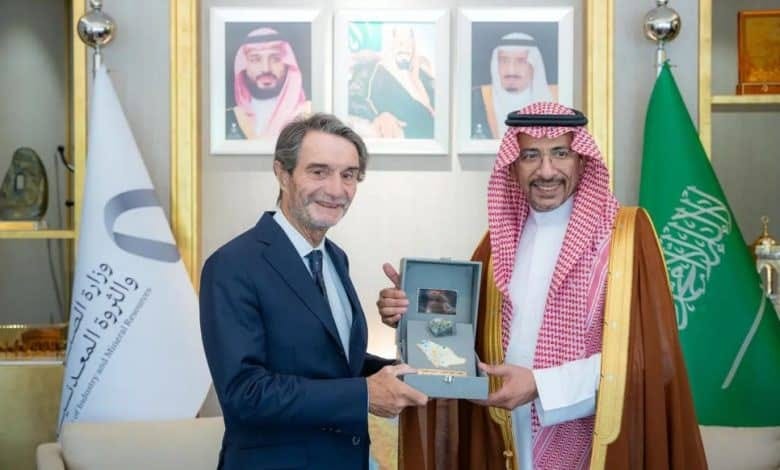
Saudi Arabia, Italy’s Lombardy Region Discuss Space Industrial Cooperation
Saudi Arabia's Minister of Industry and Mineral Resources, Bandar Al Khorayef, met with Attilio Fontana, President of Italy's Lombardy region, to explore collaborative opportunities in industrial innovation and advanced manufacturing technologies. The discussions, held at the ministry's Riyadh headquarters, centered on enhancing cooperation in sectors that align with Saudi Arabia's Vision 2030 objectives, particularly those that leverage Fourth Industrial Revolution solutions to foster sustainable economic growth. Key areas of interest included advanced industries, communications, healthcare, renewable energy, aviation, space, and information technology. Minister Al Khorayef emphasised the potential for knowledge transfer and localisation of key industrial sectors, highlighting the investment opportunities within the National Industrial Strategy. The meeting reflects Saudi Arabia's commitment to diversifying its economy and building strategic partnerships with international players.
Iran Space Developments
Iran Seeks to Take Its Place Among World’s Top Space Powers
Iran's space programme is experiencing a significant resurgence, highlighted by the recent successful launch of the Chamran-1 satellite, which was placed into a 550-kilometer orbit using the domestically developed Qaem-100 launch vehicle. This launch marks Iran's second successful satellite deployment this year, following the earlier launch of the Sorayya satellite into a 750-kilometer orbit. Developed by the Aerospace Research Institute and the defence ministry, the Chamran-1 satellite weighs 60 kilograms and aims to validate orbital manoeuvring technologies. Despite facing Western sanctions, Iran is positioning itself among the elite countries capable of satellite development and launch, signaling its ambitions in the rapidly expanding global space economy, projected to reach $1.8 trillion by 2035. The Iranian government’s Seventh National Development Plan envisions a constellation of 30 satellites to enhance telecommunications and Internet of Things (IoT) services, underscoring Iran's strategic intent to establish itself as a regional space power. While these advancements have drawn scrutiny from the U.S. government, which views the space programme as a potential pathway to missile development, Iran continues to advance its space initiatives with a focus on long-term goals, including the ability to launch significant payloads by 2026.
Iran’s Launch of Chamran-1 Satellite Sparks International Missile Proliferation Concerns
Iran’s successful launch of a new domestically manufactured satellite, Chamran-1, using its Qaem-100 three-stage solid-propellant launcher, has raised concerns among Western and Gulf Arab countries about potential military applications, particularly in ballistic missile technology. This 60-kilogram satellite, positioned at an altitude of 550 kilometers, marks Iran's continued progress in space technology amid regional tensions. The launch, conducted by the Islamic Revolutionary Guard Corps (IRGC) Aerospace Force, is part of Iran's ambitious space programme, which includes plans to launch 14 more satellites and develop an additional 30. Iran's space agency head, Hassan Salarieh, has announced upcoming launches of Kowsar, an Earth observation satellite, and Hodhod, an Internet of Things (IoT) satellite. This rapid advancement in space capabilities, possibly aided by technological assistance from Russia, China, and North Korea, has underscored international concerns about Iran’s ballistic missile proliferation. The development underscores Iran's strategic focus on becoming a regional leader in space technology, despite international scrutiny and sanctions. The country's new president, Masoud Pezeshkian, has yet to articulate his stance on the space programme, leaving questions about its future direction and pace of development.
United States Leads Condemnation of Iran’s Chamran-1 Satellite Launch
The U.S. State Department has expressed concerns over Iran's ballistic missile programme following the launch of the Chamran-1 satellite aboard the Qaem-100 satellite launch vehicle, a development associated with Iran's Islamic Revolutionary Guard Corps (IRGC). The satellite, which successfully reached a 550-kilometer orbit, is primarily intended to test orbital manoeuvring technologies. U.S. military officials warn that the technology used for satellite launches could also facilitate the development of long-range missile capabilities, potentially including nuclear delivery systems. This launch coincides with escalating regional tensions, particularly related to the Israel-Hamas conflict, and comes amid Iran's ongoing uranium enrichment efforts, raising nonproliferation alarms. The U.S. reiterated its commitment to countering the advancement of Iran's missile capabilities through various nonproliferation measures, noting that Iran's space launch vehicle programs could significantly shorten the timeline for developing intercontinental ballistic missiles.
Iran Provides Satellite Jammers to the Taliban to Censor Independent Broadcasts
The Taliban in Afghanistan has reportedly acquired satellite jammers from Iran to disrupt the broadcasts of Afghanistan International Television (AITV), the last independent channel covering human rights abuses under the regime. AITV's executive editor, Harun Najafizada, confirmed that these jammers were used to shut down the channel's broadcasts for over a week, following its critical reporting on the Taliban's treatment of women and minorities. The jammers, purchased around May 2024, were confirmed by sources within Kabul’s General Directorate of Intelligence. During the disruption, many viewers encountered a blank screen, prompting AITV to shift to a different satellite frequency. The Taliban’s actions reflect a broader strategy to control media narratives in Afghanistan, aiming to replace independent reporting with state-controlled broadcasts that align with their interpretation of Sharia law. This incident follows previous accusations against Iran for interfering with press freedom in the region, including attempts to disrupt broadcasts of Iran International during civil protests in 2022. The use of orbital jamming not only infringes on press freedom but also highlights the Taliban's ongoing efforts to restrict access to independent news sources in Afghanistan. Iran has not yet responded to these allegations.
Azerbaijan Space News
Azerbaijan Seeks Investment Opportunities in Pakistan’s Space Sector
Azerbaijan is actively seeking investment opportunities in Pakistan's oil and gas sector, as announced by Deputy Minister of Economy Samad Bashirli during the Azerbaijan-Pakistan business forum in Baku. Bashirli highlighted the potential for joint ventures not only in oil and gas but also in the non-oil sectors and space industry, emphasising projects that could yield significant investment returns. Additionally, he underscored the importance of collaboration in transport, hydrometeorology, and climate change mitigation, stating that energy remains a primary focus for enhancing the partnership between the two countries.
Azerbaijan’s Azercosmos Partners with China’s StarWin for SATCOM Terminals
Azercosmos, Azerbaijan's state space corporation, has partnered with Chinese terminal manufacturer StarWin to provide satellite communication services in remote regions via the Azconnexus satellite Internet platform and StarWin mobile satellite terminals. This agreement enables stable and uninterrupted satellite connectivity, even for vehicles in motion, while offering easily installable and portable terminals for stationary use. This initiative aims to expand reliable satellite communication infrastructure to underserved areas, furthering Azerbaijan's digital development goals.
Azerbaijan’s Azercosmos Reports Disappointing Revenues for H1 2024
From January to July 2024, Azerbaijan’s Azercosmos generated $10.9 million in revenues from satellite and telecommunication services across 48 countries, with 78 percent derived from service exports. Notable export revenues included $3.5 million from the United Kingdom, $2.2 million from Luxembourg, and $629,600 from the UAE. In comparison, the company's total revenue for 2023 was $19.8 million, reflecting a 25.56 percent decline from 2022, when revenues reached $26.6 million. This downward trend in revenue was primarily attributed to reduced service exports, particularly to the UK ($5.8 million) and Luxembourg ($4.1 million). Despite these challenges, Azercosmos remains a key player in the regional satellite services market.
Israel Space Developments
Israel’s SpaceIL Announces SpaceUP Space Educational Programme
Israel’s Space IL has launched the SpaceUP educational programme, which has been implemented in approximately 15 classrooms across Israel, aimed at mid and high school students. This initiative makes space engineering accessible by introducing students to the challenges of space missions and scientific research through videos, interactive activities, and hands-on experience with real space missions. Offered in Hebrew and Arabic, the programme will be expanded to include additional languages for global engagement. Concurrently, Space IL's engineering team is focused on developing landing technology for the upcoming Beresheet-2 lunar mission, currently slated for a 2027 launch. A recent achievement includes the successful simulation of the Beresheet-2 landing using an advanced simulator, confirming the spacecraft's design and control systems. The organisation continues to seek funding from the Israeli government, Knesset, partner countries, and private donors, with recent support from the Merage Foundation, which underscores its commitment to promoting innovation and inspiring the next generation of scientists and engineers in Israel.
U.S. Subsidiary of Israel’s Gilat Secures $5 Million SATCOM Order from Pentagon
Israel’s Gilat Satellite Networks Ltd. announced that its U.S. subsidiary, DataPath Inc., has secured contracts exceeding $5 million from the U.S. Department of Defense for core terminal services and technology upgrades. DataPath will focus on sustaining and enhancing Satellite Transportable Terminal (STT) units, which are vital for military operations. The upgrades aim to improve the performance and efficiency of existing satellite communications equipment, ensuring that military personnel have access to reliable and advanced communication solutions. Nicole Robinson, President of DataPath, emphasised the company's commitment to supporting the U.S. military and advancing national security through these enhancements.
Other Regional Space News
Emir of Kuwait Announces Launch of National Space Science Centre
A ceremony at Bayan Palace, attended by senior Kuwaiti leaders including Emir Sheikh Mishal Al Ahmad Al Jaber Al Sabah, marked the launch of a national space science centre aimed at advancing Kuwait's capabilities in space research and technology. During the event, the Emir praised the contributions of Kuwaiti researchers and emphasised the importance of supporting scientific research as essential for national advancement, particularly in fields like artificial intelligence, renewable energy, and space science. He reiterated the commitment to fostering a scientific environment that enhances national identity and capabilities, especially following the successful launch of Kuwait's first satellite, KuwaitSat-1, in 2023. Dr. Ameenah Farhan, Director General of the Kuwait Foundation for the Advancement of Sciences (KFAS), highlighted the centre's role in promoting national identity and conducting significant scientific research, reflecting the legacy of the late Emir Sheikh Jaber Al Ahmad Al Jaber Al Sabah. The initiative aims to position Kuwait among the leading countries in the scientific and technological realms, particularly in space exploration.
Yemen Becomes First Arab Country to Permit Starlink SATCOM Services
Yemen has become the first country in the Middle East to access Elon Musk's Starlink satellite internet service, a move aimed at supporting areas affected by humanitarian crises. Musk announced the availability of Starlink in Yemen via a post on X, highlighting the platform's potential to enhance connectivity in a country ravaged by conflict since 2015. The ongoing war has resulted in widespread displacement and severe famine affecting millions, with the UN estimating that 21.6 million Yemenis are in dire need of humanitarian assistance. Starlink, owned by SpaceX, utilises a constellation of satellites to provide high-speed internet, making it instrumental for individuals and organisations in crisis zones. This initiative follows Musk's previous commitments to restore internet access in conflict areas, such as Gaza and Ukraine. Despite its benefits, concerns have emerged regarding the impact of Starlink's radio waves on astronomical research, as the company continues to launch numerous satellites into orbit. Currently, Yemen is the only Middle Eastern country with Starlink service, while other Arab states remain on a waitlist for regulatory approval.
Egypt Launches Space Technology Ambassador’s Initiative
The Egyptian Space Agency (EGSA), in collaboration with the Engineers for Sustainable Egypt initiative, has launched the "Space Technology Ambassadors" programme, marking the largest awareness campaign across Egypt’s governorates. Spearheaded by Dr. Sherif Sedky, CEO of EGSA, and Eng. Mohamed Kamel, this two-week initiative aims to integrate space sciences into sustainable development efforts, aligning with Egypt’s Vision 2030. Participants will receive critical lectures covering the applications of space technology in industrial development, its role in sustainable development, and investment opportunities in the space sector. Delivered by leading experts, the programme is designed to enhance awareness, improve skills in space technology, and equip attendees with the knowledge needed to foster sustainable progress in their communities.
Bahrain Space Engineer Yaqoob Al Qassab Wins SSPI 20 Under 35 Award
Bahrain's National Space Science Agency (NSSA) has announced that Space Engineer Yaqoob Al Qassab has received the prestigious "20 Under 35" Future Leaders award from the Space and Satellite Professionals International (SSPI) for 2024. Al Qassab stands out as the only Arab and Middle Eastern recipient among this year's winners, underscoring the achievements of Bahraini youth in the fields of space science and satellite development. His recognition comes as a result of his academic and professional excellence in satellite construction and significant contributions to advancing the sector both locally and globally. NSSA CEO Dr. Mohamed Ibrahim Al Aseeri expressed pride in this accomplishment, which aligns with Bahrain's growing prominence in the space industry and reflects the vision of the Bahraini leadership.
Iraq Official Discusses 5G and Satellite Internet Connectivity at UN Event
Ali Al Moayyed, Chairman of Iraq's Communications and Media Commission, engaged in discussions with Bocar Ba, CEO of the Samena Council, regarding the future of 5G and satellite internet in Iraq during the Summit of the Future in New York. The Samena Council, a prominent alliance of telecommunications companies across South Asia, the Middle East, and North Africa, provided a platform for examining the development of Iraq's telecommunications sector. The dialogue emphasised the mechanisms for implementing 5G services, highlighting the necessity of adopting advanced technologies to improve connectivity and support the digital economy. The discussion also explored satellite internet services, including licensing practices, potential environmental impacts, and interference issues with terrestrial frequencies. Al Moayyed advocated for enhanced telecommunications through global workshops focused on innovations like artificial intelligence and big data. His participation in the Summit of the Future, a key UN event addressing sustainable development, peace, and digital futures, underscores Iraq's commitment to aligning its telecommunications advancements with global standards and challenges.
Be sure to catch up with space activities in the region in the next edition of Middle East Space Monitor’s space roundup!

